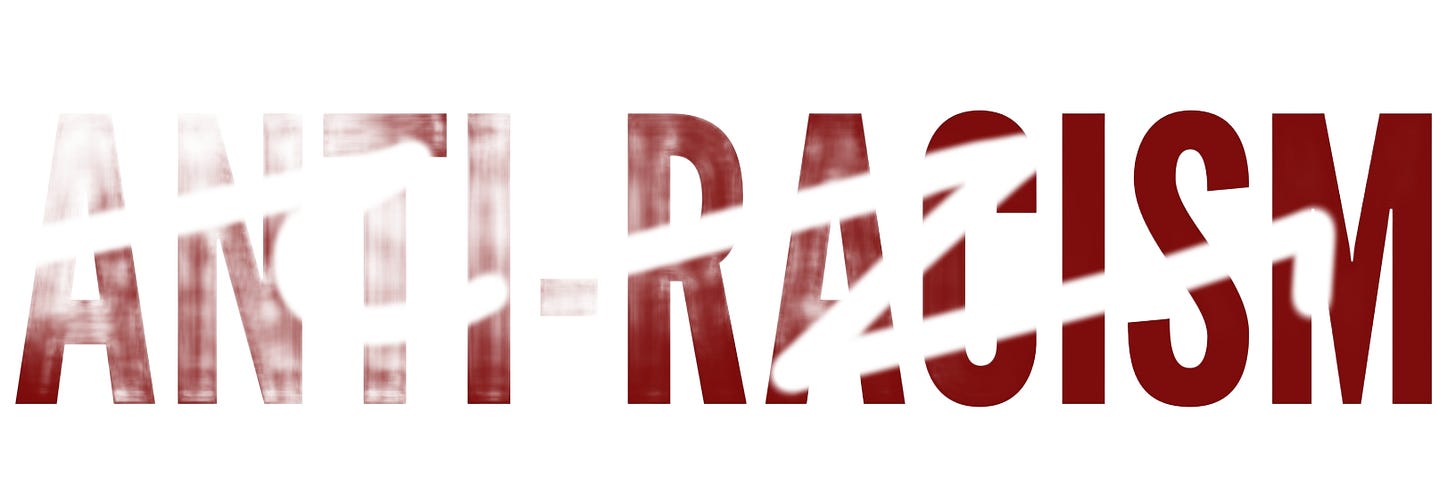E-Pluribus | October 6, 2023
The problem with "antiracism"; a look back at the French and American Revolutions; and "color-blind" as pejorative.
A round-up of the latest and best writing and musings on the rise of illiberalism in the public discourse:
Pamela Paul: ‘Antiracism’ Was Never the Right Answer
The troubles for Ibram X. Kendi’s anti-racism center may just be beginning. Whatever might be lost won’t impact the struggle against racism significantly, argues Pamela Paul at the New York Times. If anything, the concept’s demise could actually shift the focus to more realistic solutions.
“The only remedy to racist discrimination is antiracist discrimination,” [Ibram X.] Kendi wrote, in words that would be softened in a future edition after they became the subject of criticism. “The only remedy to past discrimination is present discrimination. The only remedy to present discrimination is future discrimination.” In other words, two wrongs do make a right. As practiced, that meant curriculums that favor works by Black people over white people are one way to achieve that goal; hiring quotas are another.
Among the book’s central tenets is that everyone must choose between his approach, which he called “antiracism,” and racism itself. It would no longer be enough for an individual or organization to simply be “not racist,” which Kendi called a “mask for racism” — they must instead be actively “antiracist,” applying a strict lens of racism to their every thought and action, and in fields wholly unrelated to race, in order to escape deliberate or inadvertent racist thinking and behavior. “What we say about race, what we do about race, in each moment, determines what — not who — we are,” Kendi wrote.
[. . .]
Yet, as the psychologist and author Jonathan Haidt pointed out, Kendi’s dichotomy is “incorrect from a social-science perspective because there are obviously many other remedies,” including ones that address social, economic and cultural disparities through a fairer distribution of resources.
[. . .]
His vision of antiracism had considerable influence in shaping the national conversation around race. As Tyler Austin Harper wrote in The Washington Post last week, “No longer a mere ambassador for academic antiracism, Kendi became a brand.”
[. . .]
Contra Kendi, there are conscientious people who advocate racial neutrality over racial discrimination. It isn’t necessarily naïve or wrong to believe that most Americans aren’t racist. To believe that white supremacists exist in this country but that white supremacy is not the dominant characteristic of America in 2023 is also an acceptable position.
And while a cartoon version of colorblindness isn’t desirable or even possible, it is possible to recognize skin color but not form judgments on that basis. A person can worry that an emphasis on racial group identity can misleadingly homogenize diverse groups of people, at once underestimating intraracial differences and overemphasizing interracial ones. The Black left-wing scholar Adolph Reed, for example, decried the emphasis on race-based policies. “An obsession with disparities of race has colonized the thinking of left and liberal types,” Reed said in an interview with The New York Times. “There’s this insistence that race and racism are fundamental determinants of all Black people’s existence.”
Read it all.
Cathy Young: Two Cheers for the French Revolution
A mention of the French Revolution immediately conjures images of guillotines and mobs, but Cathy Young writes at Persuasion that there’s far more to it. Young separates the good from the bad, compares and contrasts it with our own revolution, and draws some lessons that can still be useful today.
[T]he French Revolution’s conservative critics are themselves eliding important facts. Its moderate and even conservative side, early on, is rarely remembered because it tends to be overshadowed by later and more dramatic events. Yet it started out as a push for liberal reform. On the opposite side of the coin, the American Revolution, though it was conservative insofar as it aimed to preserve some colonial institutions, was unquestionably radical in asserting America’s right to sever its tie to the British monarchy, in proclaiming that government exists for the benefit and with the consent of the governed, and in abolishing all hereditary distinctions between (male) citizens. We need a more nuanced understanding of the two revolutions from which liberalism was born—one that acknowledges the flawed but radical potential of both.
[. . .]
Did the French Declaration of the Rights of Man (whose final draft was the work of two moderates, the Marquis de Mirabeau and the Abbé Sieyès) contain a more radical and utopian vision than America’s founding documents? It certainly contained more abstract and philosophical language than the American Bill of Rights, which was written around the same time but is much more specific and pragmatic. The French Declaration featured such vague statements as “The law has the right to forbid only actions harmful to society” and “The law is the expression of the general will.”
But it also enshrined many of the principles viewed as key to the success of the American experiment: the separation of powers, judicial independence, and the inviolability of individual rights, particularly protections against arbitrary prosecution and punishment. Article VIII states: “No one can be punished but under a law established and promulgated before the offense and legally applied.” Article IX elaborates further: “Any man being presumed innocent until he is declared culpable, if it is judged indispensable to arrest him, any rigor which would not be necessary for the securing of his person must be severely reprimanded by the law.”
[. . .]
Why, then, did the French Revolution, unlike its American counterpart, go so wrong?
[. . .]
[T]he American Revolution was essentially about independence from the British Crown; King George and his government were thousands of miles away, and the use of force to settle the conflict came primarily in the form of a war in which violence was regulated and contained by rules and discipline. By the time the United States came into existence as a nation, the war was over, and the newly formed republic faced no external threats.
French liberalism also faced the gargantuan task of dismantling a vast and elaborate system of feudal and aristocratic privileges; colonial America had nothing remotely similar, despite the existence of a local aristocracy. The early French revolutionaries’ attempts to build on existing traditions of liberty failed not because they were universalist utopians, but because France, unlike America, had no functional institutions suited to liberal governance.
[. . .]
In addition, while the first cohort of French revolutionaries was no more utopian than America’s Founders, there was one way in which the American revolutionaries were much wiser: they were, from the beginning, far more concerned about “mobocracy.” The American Revolution did feature far more political violence than is often recognized, with plenty of vicious attacks and intimidation toward Crown officials and ordinary Loyalists. Yet partly because leading Patriots were fairly unambiguous in their disapproval of such tactics, they remained limited and seldom fatal.
Read it all here.
Andrew Sullivan: Could MLK Give A TED Talk Today?
Modern day civil rights activists often downplay one of the key parts of Martin Luther King’s dream: “a day when people will not be judged by the color of their skin, but by the content of their character.” Based on the recent response to Coleman Hughes’s TED talk, Andrew Sullivan isn’t convinced King’s message would be welcome if he were still around to deliver it in person.
The brilliant and pathologically civil writer, Coleman Hughes, was put through the wringer at TED, and had his talk suppressed, because it echoed Martin Luther King Jr’s goal of color-blindness in society. A panel at the American Anthropological Association was suddenly canceled because it was about the remaining salience of biological sex in the discipline. A panel on a Harry Potter production in London at Comic Con was canceled after a transqueer hissy fit. And a Bloomberg study of corporate hiring in 2021 found that only 6 percent of jobs that year went to whites, while 94 percent went to “people of color.” Even accounting for generational shifts in demographics, that’s an indicator that Kendi’s dictum — “the only remedy for past discrimination is present discrimination” — was taken very seriously.
When I’m told that these incidents are trivial, or marginal, I have a simple response. Ideas matter. They matter more in the long run than the most powerful individuals; ideas shift the minds of people in ways that change society more profoundly than anything else. Kings and presidents and regimes come and go — but ideas last. Once obscure scribblers like Hobbes, Machiavelli, Locke, Marx, or Nietzsche created the world we live in. And when you swap one set of ideas as the basis for society for another one entirely, it is not just an intellectual exercise. It’s a life- and world-changing one. If you haven’t experienced the effect of this in the last few years, you need to get out more.
And the philosophy that underpins the stymieing of Hughes’ speech and so many other appalling incidents of intolerance over the last few years is a real one, constructed quite recently. And the leaders of this movement, unlike its more winsome critics, really believe, as I do, that ideas matter — which is why, since the failure of 1960s campus activism and domestic terrorism, they have worked from the universities outward to control and change the world. And triumphed!
[. . .]
For those who tell me to chill out, I have to repeat: ideas really do matter. You cannot graft deeply illiberal practices and neo-Marxist ideology onto a liberal polity for very long, before the contradictions force a resolution. A House divided so profoundly cannot stand. But the surrender of the Democratic liberals and the insane radicalization of the GOP almost certainly means that peaceful, liberal politics may well not be capable of resolving this contradiction. Which means that something much darker and more violent will.
Read the whole piece.
Around Twitter (X)
Parents Defending Education just published a list of questions to help moms and dads investigating “equity grading” at their children’s schools. It’s an informative primer for those not familiar with the concept as well.
Tyler Harper, assistant professor at Bates College, on the hidden privilege DEI statements convey on a group of, ironically, elites:
And finally, National Review’s Dan McLaughlin has written about the misuse of “ban.” Zaid Jilani notes one of the incentives to do so.










